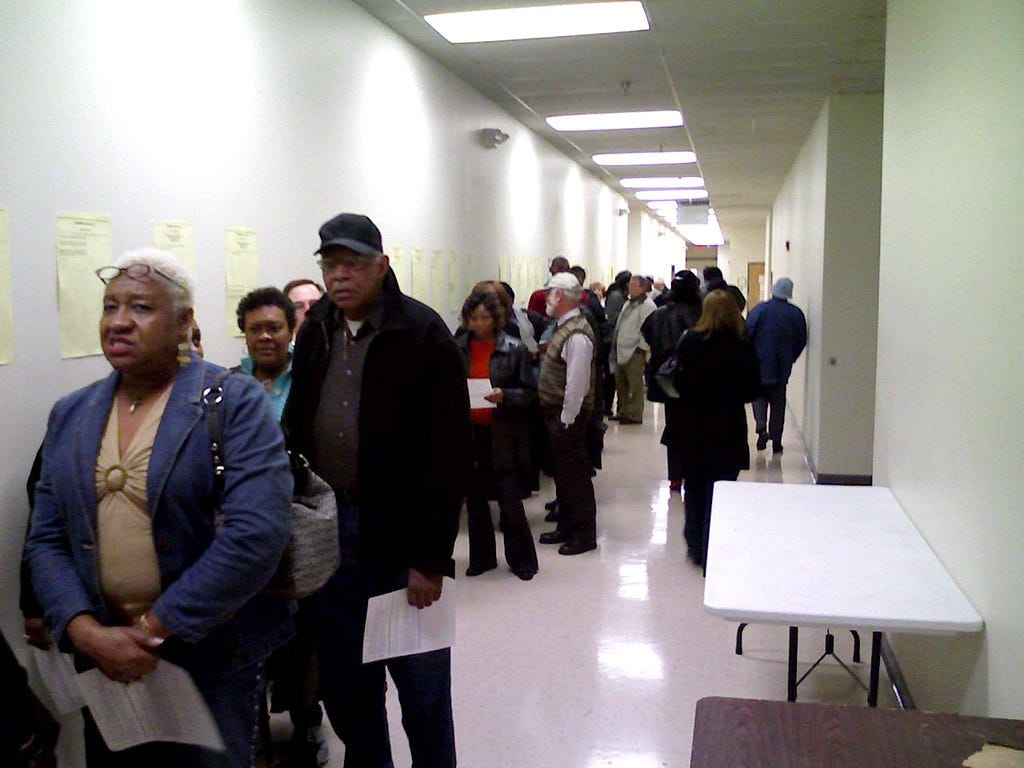
Oregon is joining the ranks of states arguing about the right to vote. Unlike GOP-controlled legislatures that have tightened the franchise since 2010, Oregon’s Democrats hope to go the other way, by restoring the right to vote to felons. Their bill, H.R. 4147, awaits action in the House Rules Committee.
I say “restore” because denying the vote became a tool of oppressing Black people following ratification of the 15th Amendment. The debate over felon disenfranchisement—what academic Alec Ewald called “civil death”*—gives rise to a question: How did we as a nation attach the franchise to criminal conviction?
America’s disenfranchisement laws date to the colonial period and have their precedents in the Enlightenment and Ancient Greece. They emerged from twin strains of thought.
The liberal strain, reflecting John Locke, argued that citizens’ relationship with the state was self-interested and contractual. We agree to rules in exchange for security; if we break the rules, we lose the right to participate in their formation.
The republican strain, common in early New England, held that the “body politic” was not merely an agreement among self-interested persons but an actual body dependent upon “virtue.” Disenfranchising criminals was a matter of protecting the body from corruption. Loss of the right to vote was a public aspect of conviction upon which courts passed specific sentence.
Both strains developed when voting was restricted to white, male, property owners. Over time, of course, we have broadened our concept of citizenship. The Constitution nowhere mentions a citizen’s right to vote until the Fourteenth Amendment, and today Americans accept voting as the cardinal marker of democracy.
Having grown from a collection of villages where the privilege was concomitant with civic virtue, to a nation of 300 million strangers under distant governments, what is the contemporary rationale for disenfranchising citizens? Does it fit with a purpose of criminal punishment? Traditionally a sentence is tied to one or more of four aims: retribution, incapacitation, deterrence, or rehabilitation.
Disenfranchisement is retributive – the denial of a right. But it’s also a “collateral” sentence, not handed down in court but automatic and unmentioned.
It is incapacitating only if the criminal had engaged in election fraud (whereas imprisonment for larceny will incapacitate the opportunity to steal).
It’s unlikely to be deterrent – no one thinks about the right to vote while committing crime (unless perhaps the crime relates to voting).
And it’s contrary to rehabilitation: studies have shown reduced recidivism for those whose voting rights are restored.
So what is the purpose?
It is no accident that disenfranchisement became all the rage in the 1870s. In the “Redemption” following Reconstruction, former Confederate states rewrote their constitutions to deny suffrage to felons—part of an effort to remove former slaves from the voter rolls. Many states rewrote their constitutions to tie voting rights to crimes that legislators more commonly associated with African-Americans. Thus conviction for theft and wife-beating resulted in disenfranchisement, while robbery and murder did not. Only two states, Maine and Vermont, never disenfranchised felons; for 400 years they have been two of our whitest.
After Richard Nixon’s “law and order” campaign in 1968, states expanded their list of felonies, especially with rise of the drug war. Even a cursory examination shows the disparate effect of disenfranchisement on White and Black Americans. The world’s preeminent democracy, the United States, is the world leader in incarceration—and disenfranchisement.
Leaving aside our prejudgments, what is this fight about? Is it about a belief that felons don’t deserve the vote? If you believe that, consider: Where did that belief come from? How did the United States come to take this unusual position among our closest friends? The European nations from whom we drew our predominant culture do not take away the right to vote.
I grew up thinking, as many people do, that losing the right to vote was just a normal part of a felony conviction. It isn’t. It’s a manufactured element of our history.
* I am inspired by Ewald, 'Civil Death’: The Ideological Paradox of Criminal Disenfranchisement Law in the United States (Wisconsin Law Review, pp. 1045-1132, 2002)
Bennett Minton covered Congress as a reporter and policy analyst for three decades. He blogs at TransformationalCitizenship.com




This article is completely misleading. Only incarcerated felons can not vote in Oregon, and that is only true until they have served their sentence. Even convicted felons on probation or parole can vote.
Felons in Oregon can vote. After they get out of prison but of course liberals think they have a right to vote in prison. No they lost that right. Gee.